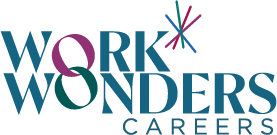Four Resume Mistakes You Might Be Making
If you know me, you know I freaking love resumes.
A lot of people think they’re a relic.
But I know that they have the power to open doors and propel your career forward - even when nobody knows who you are.
They can help you land a huge increase in salary that can change your life.
Why *wouldn’t* you want to take your resume seriously???
Resumes are a marketing tool that help you convey your value and expertise for specific opportunities.
We want clients to be excited about their resume, to know how to use their resume, and how to make modifications as their career develops or their interests change.
Addressing these common mistakes won’t just help you get traction.
It will help you appreciate your resume, invest time in it, know how to use it strategically, and maybe enjoy the process a little bit more.
Mistake #1: Skipping critical prep work
I want to emphasize the importance, and the helpfulness, of doing some writing, brainstorming and documenting BEFORE you sit down to work on your resume.
It’s really hard to sit down to “fix” your resume.
We break the process down into documenting and writing ...and then revising!
If you take the time to do this work first, it will be so much more obvious how you can improve your resume!
Here’s a common cycle our clients report having:
“Ok, I’m ready to start my job search. I’m ready to apply for x and y kinds of roles.”
And then they log into LinkedIn and see all kinds of other jobs that they’re kinda curious about.
But then you start to think, well, you’re not qualified for those kinds of roles.
So you get frustrated and log out? Or do you email yourself jobs that you never apply for?
Or a friend will be like “So what do you want to do next?” And you’re like ❓😕😕😕❓
If any of this sounds familiar, you probably need to focus on this initial step of reflection.
This is where we do a deep dive into your goals, document your experience and start to really understand your values and contributions.
It is also where we set priorities for your search, based on those things.
It is also where we uncover transferable skills. It’s where we lay the foundation for strategically communicating your value.
Taking the time to prepare and reflect helps to gives our search integrity, boundaries and constraints, and a chance to be honest about what we’ve experienced at work.
This is about setting YOUR goals and criteria - and that often means unlearning or de-prioritizing criteria you’ve been told is critical.
You need space in your search to reflect on what matters to you - before you polish up your resume!
Mistake #2: Applying everywhere
The Eject Button Strategy. An SOS, if you will.
People often rely on the volume of applications to get traction.
“If I just apply for enough roles, someone will get back to me.”
If you have basic safety and security, if you have 5, 10, 15, or more years of experience - there is really no need for you to apply everywhere.
You’d be much better off focusing on ensuring the quality and alignment of your applications rather than volume.
Mistake #3 Applying nowhere
Unsure, lacking confidence, fearing of rejection are pretty common - and keep people from applying to any jobs at all!
We just have no idea if your resume can work for you if we don’t use it!
We’re looking for a sweet spot that gives us some options, provides consistency, as well as enough time to put together quality applications.
If you’re applying to 10+ jobs a week or more, there’s a chance that the quality of your applications isn’t aligning with the jobs you’re looking for.
4-8 jobs/month is a great initial sweet spot. There’s enough volume that we’ll be able to really assess your resume and search in a few weeks. With 4-6 weeks, you’ll be much, much better at applying for jobs, you’ll probably be able to create some helpful infrastructure for your search - sample resumes, bullet points, and cover letters that you can easily modify going forward.
In other words, 1-2 jobs/week for 4-6 weeks is pretty transformative for most job seekers.
Mistake #4: Asking *everyone* for feedback
If you ask a dozen people for feedback on your resume, you’re going to get a dozen different opinions.
What I want my clients to be able to do is look at a job posting and know how to curate their experience for the role, understand what the hiring stakeholders are looking for - and to speak to that concisely and effectively.
There’s more than one way to do this well and while of course, we give feedback to our clients on their resumes, we want them to build a sense of how to use their resumes on their own.
Your resume should a) address the qualifications of the job as clearly as possible and b) leave you feeling more confident.
Learn to be a good judge of your own applications!!
Want to more resume and job search tips?
Make sure you check out our Off the Clock Podcast. It’s a private podcast, just for members of our community. We’d love to have you join us!

